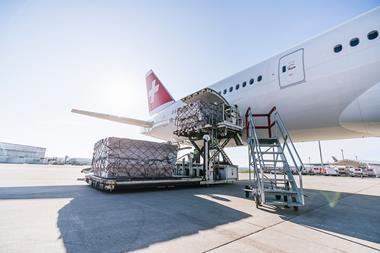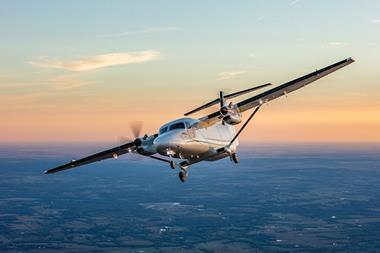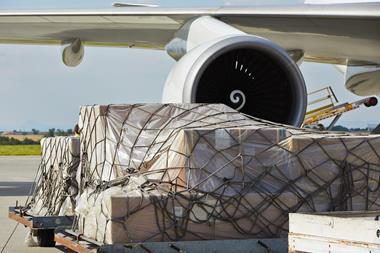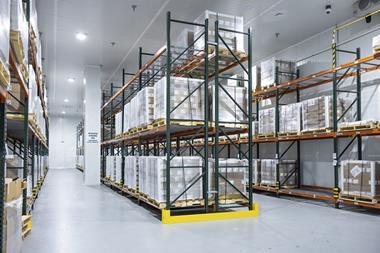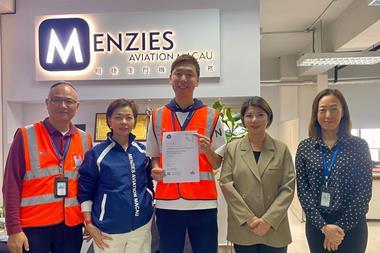It is 50 years since Chris Chapman and Mike Freeborn began marketing Alaska International Air’s fleet of Hercules freighter aircraft.
At its peak, Alaska International Air operated five aircraft, but with business faltering in the local oil and gas industry Chapman Freeborn then utilised these aircraft for ad hoc charters and longer-term contracts in Africa and later across the globe.
In the 1970s, the Hercules and other chartered aircraft types were used to transport everything from oil and gas equipment to automotive parts.
Changes in consumerism in the 1970s also meant that empty-leg flights would often be filled with fruit and vegetables destined for supermarkets.
In 1980s, Chapman Freeborn opened its first office outside of the UK in Frankfurt (led by Carol Norman) and played an important role in the effort to transport food and medical supplies when widespread famine hit Ethiopia.
The 1990s was a period of rapid expansion that saw the opening of offices in Poland, US, Belgium, Singapore and the UAE.
The 2000s saw the company open its first office in China, play a key role in the Tsunami response and launch its onboard courier service.
In the last 10 years, the company has continued to expand its office presence, purchased animal transport specialist Intradco and became the majority shareholder of Magma Aviation.
That 1973 entrepreneurial spirit launched the Chapman Freeborn air charter business, which is now part of Avia Solutions Group, a global aviation holding company, lives on.
After the anniversary cake-cutting ceremony at the Air Cargo Europe exhibition and conference in Munich, celebrating 50 years of freight charter history, Neil Dursley, Group chief commercial officer at Chapman Freeborn shared some insights into the company’s future plans.
Dursley’s air cargo career includes freight forwarding experience with Emery Worldwide/Menlo and then with the express parcel and logistics giant UPS, which acquired Menlo.
He is responsible for the day-to-day operations and strategic planning of Chapman Freeborn, plus the financial performance of the business and its subsidiaries. He has over 30 years of experience, having also previously worked at Panalpina for several years.
Dursley joined Chapman Freeborn in 2019 but had known chairman Russi Batliwala since 2004 when they worked together in the Middle East.
Military precision
Dursley had moved from the UK to Dubai with UPS at the time of the war in Iraq, to look at the supply chain for the US military.
“I met Russi in my office in July 2004 and said that I wanted to explore creating an airbridge out of Sharjah into Iraq, to an airbase north of Baghdad. He asked me how much freight we had, and I said nothing because the company had been flying into Kuwait and then trucking supplies into Iraq.
“It was a nightmare, with all the improvised explosive devices (IEDs). I wanted to bring everything in by air and on December 19, 2004, we operated the first flight by Chapman Freeborn to Balad airbase with an IL-76 aircraft.
“From that moment on the business literally took off and we became Chapman Freeborn’s biggest customer, operating an average of 90 full charter flights a month, just for Iraq, and on average some 65 flights a month into Afghanistan, primarily on behalf of the US military.”
Dursley and Batliwala worked closely together, with 6am calls every morning to handle a daily charter bid from US transport command.
Dursley says of Chapman Freeborn: “They used to come up with good solutions and good pricing and we won a lot of business.”
There were five companies holding a contract with the US government to compete for charters within the biggest such programme at that time, Theatre Express, which dealt with supplies moved from Iraq to Afghanistan and from Kuwait to Iraq or Bahrain.
“It was a crazy time,” says Dursley.
That experience of serving complex military supply chains during regional conflicts has been replicated to some extent to provide charters for Ukraine after its invasion by Russia.
Chapman Freeborn, now offering an expanded number of logistics solutions since the Iraq programme, is again working with freight forwarders holding contracts with NATO countries to provide support for the movement of US-related goods going to Poland and Germany, with Ukraine as the final destination.
Dursley says: “Our Ukraine supply chain programme started in March 2022, and Chapman Freeborn has diversified considerably since 2014, through mergers and acquisitions.
“The three shareholders realised that full charter brokering was not going to survive and so needed to diversify through acquisition and so the company acquired a majority stake in Magma Aviation in 2017.”
Chapman Freeborn has been utilising Magma’s Boeing 747s on behalf of freight forwarders out of the US into Germany, in support of Ukraine.
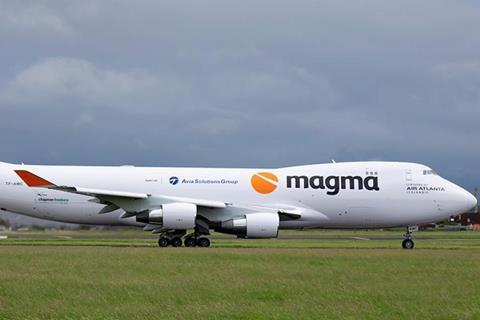
Photo: Chapman Freeborn
Dursley adds: “We have also been handling multiple NGOs from the Middle East, the US and Europe into the surrounding countries of Ukraine, including Macedonia and Hungary, but mostly Poland.”
Airfreight commentators have drawn comparisons between the wartime charter operations and the Covid airlift to provide the world with personal protective equipment (PPE) and other medical supplies, including vaccine distribution.
Dursley says: “I would say that there were a lot of similarities with Covid to the peak demand of the wars in the Middle East but there was a difference to the requirements.”
The similarities included flights for the US government, for example in relation to The Federal Emergency Management Agency (FEMA) which required PPE and medical supplies coming out of Asia in what was known as the US Air Bridge.
But the key difference to the Middle East situation is that Covid meant that “literally thousands of wide-bodied aircraft were operating at ridiculous costs to meet supply and demand”, says Dursley.
And while Chapman Freeborn was involved in that to a degree: “The majority of what we really got involved with was in support of various governments and NGOs in relation to the movement of PPE as well as Covid test kits worldwide.
“We were moving everything, using passenger-to-freighter converted aircraft to the AN-225 just before the Ukraine crisis, on flights into Austria, Denmark and even into Shannon.”
Pheonix from the flames
The Ukraine-based AN-225, a one-of-a-kind six-engine giant freighter, also known as Mriya or ‘dream’ in Ukrainian, was severely damaged early in 2022 during a Russian bombardment of the capital Kyiv.
The giant workhorse freighter, which had required regular maintenance because of its heavy flight programme during the Covid crisis, was in a hangar in Kyiv when it was hit.
The Ukrainian government has pledged to rebuild the Mriya, which had acquired a cult status among plane-spotters and aviation professionals because of its size, elegance, and ability to handle the largest and most difficult of cargo to be flown.
Dursley says: “The AN-225 is and was a unique airframe and immensely important for project-related cargo. During Covid it was all about how much volume could you move in a single flight, and literally thousands upon thousands of boxes were loaded on the AN-225.
“Those boxes could have been loaded on any aircraft type but just not with the same sheer volume.”
Dursley describes the AN-225 as a beautiful aircraft and says that it will come back: “There will be another one.”
Newspaper pictures of the shattered AN-225 appear to show the burnt remains of the aircraft nose section while stern end, including the wings and engines, seem less damaged. Can the Ukrainian engineers really make the AN-225 fly again, phoenix-like from the ashes of the hangar?
Dursley says: “I hope and pray that they do because I fell in love with Mriya when I met her on her 30th anniversary in May 2019, in Kyiv, when I was invited there by Antonov Design Bureau.”
A cynic may question whether restoring the AN-225 to an operational freighter is more of a romantic ambition and aspiration than a practical reality.
Dursley dismisses firmly such doubts: “I am tired of all the negativity. I’ve always believed that the AN-225 has been a significant aircraft for the industry.
“To secure a flight with the AN-225, to see one and to load one, had always been one of the top priorities in their career for every company I’ve worked with.”
He believes that the AN-225 must return to the global freighter aircraft fleet and that there is both the will and finance to achieve that goal.
“It has to come back. There are enough people in this industry who have the money to ensure that it does come back.”
And what of the current freighter charter market, as the global economy, post-Covid, now copes with higher prices because of the war in Ukraine?
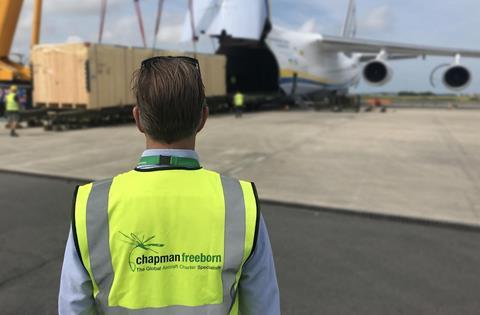
Dursley says: “The market changed significantly within the space of a year. The Covid test kits that were moving disappeared almost overnight and the Chinese New Year in 2022 was just before the Ukraine situation occurred.
“Everyone assumed, after Chinese New Year, that manufacturing would come back in China and volumes would increase again, but they didn’t for several reasons. There were a lot of lockdowns in China in 2022 which meant that manufacturing didn’t happen.
“And, because of the Ukraine situation, just through AirBridgeCargo alone, part of the Volga-Dnepr Group, the airfreight market lost 18 747s and 11 Antonov Design Bureau AN-124s. A lot of that capacity was moving from China to Europe and from China to the US, and it just disappeared.
“In some respects, it was good for other operators in the industry but so many factors impacted the business, including a reduced number of AN-124s.”
Lessons learned?
The airfreight sector has successfully navigated several global crises in the past, where the market has subsequently stabilised and gone back to normal. But has the freighter charter market served by Chapman Freeborn and other companies changed markedly and permanently as a result of Covid and then the war in Ukraine? Have new lessons been learned?
Dursley says: “We are still in a very dynamic market with the Ukraine situation still ongoing. But in the charter market, when we wake up every morning, something has always changed in the industry or in the world.”
He gives as one example, the Turkey-Syria earthquake in February this year.
“That humanitarian crisis once again created an insane requirement for charters because of the emergency situation. It was a massive earthquake and NGOs around the world were desperate for supplies of personnel from various governments in Europe to support the emergency response.
“You have got a similar but different situation in Sudan which is creating challenges in getting permits: landing permits and overflight permits. But we are overcoming those challenges because we have an emergency response team that we can activate within minutes of such events. Our team of experts have been doing this for 20 years.”
In 2019, Chapman Freeborn was acquired by ASG, led by chairman Gediminas Ziemelis, a charismatic figure who has ambitious plans for the group, continuing a growth strategy that now comprises a current fleet of around 180 aircraft.
Before the deal was completed, Chapman Freeborn was owned by Russi Batliwala, Shahe Ouzounian and Peter Joarder who played an important role in the company’s development and began acquiring the business in 2009 through a management buyout from founders Chris Chapman and Carol Norman.
After those initial steps in the 1970s, Chapman Freeborn is now an important part of a large aviation group, so in these unpredictable times what does the future hold?
Dursley says: “Chapman Freeborn has solidified its position as the market leader in the industry on a global scale and we are funded by Avia Solutions Group.
“The expansion and the investments have put us in the position to support more clients globally, be that on an ad hoc basis support for humanitarian or natural disasters, or for supply chains in general. There is no company better positioned to support their supply chains.”
Click here to read more about Chapman Freeborn’s development over the past 50 years.
https://www.aircargonews.net/services/charter-company/chapman-freeborn-lays-out-its-plans-at-ace/
https://www.aircargonews.net/airlines/freighter-operator/magma-aviation-starts-first-regular-flights-into-china/






